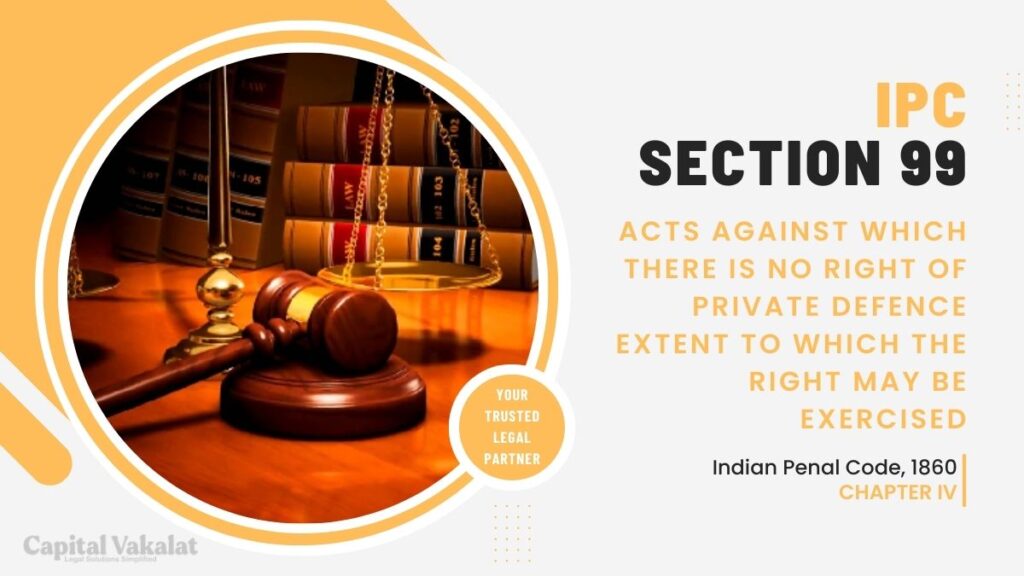In the realm of criminal law, the right to self-defense is a fundamental concept. However, this right is not absolute; there are situations in which it cannot be invoked. Section 99 of the Indian Penal Code (IPC) elucidates the acts against which there is no right of private defence and outlines the extent to which this right may be exercised.

In this comprehensive article, we will delve into the intricacies of Section 99 IPC, shedding light on its provisions and implications.
What is Section 99 of IPC?
Section 99 of the IPC serves as a crucial provision that clarifies the limits of the right of private defence. It specifies certain acts against which individuals cannot claim this right.
Section 99 IPC serves as a shield against the consequences of actions taken in self-defence. It essentially stipulates the acts against which there is no right of private defence. This legal provision ensures that individuals, while defending themselves or their property, do not cross the line into unlawful territory.
Extent of the Right
1. Protecting Life
The primary and most fundamental aspect of the right to private defence is protecting one’s own life. If an individual faces an imminent threat to their life, they are entitled to take necessary measures to repel the aggressor. This extends to the use of force, even to the extent of causing death, if no other option remains.
2. Protection of Body
Section 99 IPC also acknowledges the right to safeguard one’s body from harm. If someone is subjected to physical violence or assault, they are legally justified in using reasonable force to defend themselves. However, the response must be proportionate to the threat posed.
3. Preservation of Property
When it comes to the protection of property, the right of private defence is not boundless. An individual can use force to defend their property against theft, trespass, or damage, but only within reasonable limits. Excessive force or retaliation may lead to legal repercussions.
4. Exceptional Circumstances
It’s important to note that the right of private defence is not absolute. Section 99 IPC lays down specific situations where this right cannot be invoked. These include cases where there is no imminent threat, acts committed out of revenge, or when there is a reasonable opportunity to seek help from law enforcement.
Acts Exempted from Private Defence
Harm to Public Servants
One of the primary acts against which the right of private defence does not apply is when harm is inflicted upon public servants while discharging their duties.
Acts in Good Faith
Actions performed in good faith, even if they result in harm, do not grant individuals the right to exercise private defence.
Excessive Force
Section 99 also highlights that excessive force beyond what is necessary for self-defense is not protected by law.
Striking a Balance
The essence of Section 99 IPC lies in striking a balance between the right to protect oneself and the need for restraint. While individuals have the inherent right to defend themselves, this right should not be used as a license for excessive violence. The law encourages proportional response and discourages vigilantism.
Practical Implications
Seeking Legal Counsel
If you find yourself in a situation where you believe self-defense is necessary, it’s crucial to consult with legal experts who can guide you through the complexities of Section 99 IPC.
Reporting Incidents
In cases involving harm to public servants or acts in good faith, reporting the incident promptly is essential to establish your position.
Conclusion
In conclusion, Section 99 of the IPC serves as a vital legal provision that delineates the acts against which there is no right of private defence. Understanding the nuances of this section is imperative for individuals to exercise their right to self-defense judiciously and within the confines of the law.
In a society that values personal safety and property rights, Section 99 IPC plays a crucial role. It sets clear boundaries for the exercise of the right of private defence, ensuring that individuals can protect themselves and their property within the confines of legality. Understanding these boundaries is essential for every citizen to navigate the complex terrain of self-preservation while upholding the principles of justice and law.
Remember, the law is a guardian of both our rights and responsibilities, and Section 99 IPC serves as a testament to this delicate balance.
In this article, we have explored the nuances of Section 99 IPC, shedding light on the acts against which there is no right of private defence and the extent to which this right may be exercised. It’s essential to remember that while self-defense is a fundamental right, it must be exercised judiciously, keeping in mind the provisions of the law.
If you ever find yourself in a situation where you need to invoke the right of private defence, seek legal advice and report the incident promptly to ensure that your actions are in accordance with the law.
FAQs
Does this section apply to acts committed in good faith?
Yes, acts performed in good faith, even if they result in harm, are exempt from the right of private defence as per Section 99 IPC.
Are public servants immune from self-defense actions?
No, public servants are not immune, but harm inflicted upon them while discharging their duties cannot be justified as an act of private defence under Section 99 IPC.
When can private defence be invoked?
Private defence can be invoked when there is a threat of serious harm or grievous offenses, provided that the response is proportionate.
What should I do if I believe I’ve acted in self-defense?
If you find yourself in such a situation, it’s advisable to seek legal counsel and promptly report the incident to the authorities to ensure that you are well-protected under the law.